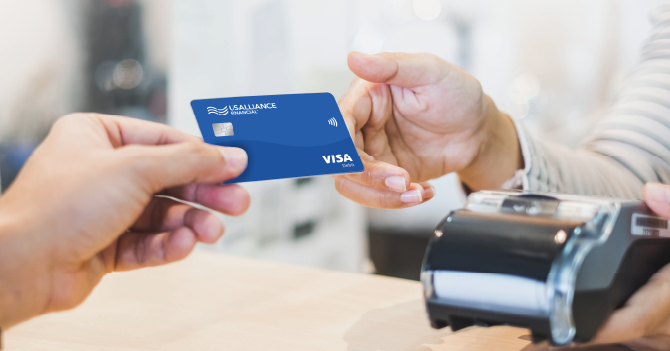
“Debit or credit” has become the refrain of retail transactions. After selecting your purchases, it’s seemingly the biggest decision you have to make. For many people, the choice doesn’t get a second thought. In this article, we’ll look at three reasons why choosing your debit card for retail transactions may be the smarter move.
Double-authentication and fraud protection
If you’re concerned about security, there are a number of great reasons to use your debit card. First among them is the additional security of a PIN. That extra layer of security is what experts refer to as “two-factor authentication.” In order to convince a terminal that you are authorized to withdraw funds, you need two things: the card number and the PIN. This security layer combines a “possession factor” — that you have the card — with a “knowledge factor”— that you know the PIN.
Credit transactions, those done with a signature as an authentication mechanism, are not terribly reliable. Using a PIN transaction at a register can reduce the odds of fraud significantly. One study of point-of-sale transactions discovered that rates of fraud for these transactions were almost six times lower when a PIN was used. This makes sense if you’ve ever seen retail workers examining signatures. Expert handwriting analysis is inconsistent at best. When practiced by someone with no formal training, it’s no better than guesswork.
Even recent, large-scale data breaches, illustrate the added layer of security a PIN-based debit transaction provides. While credit card numbers were compromised, PINs remained secure because they’re processed by a separate system. This means folks who made PIN-based debit transactions were more protected from fraud. Hackers stole one number, but without the other, it was less useful. That’s two-factor authentication at work for you.
Lower transaction fees can mean discounts
Credit card companies make money in a surprising number of places. The obvious ones, like annual fees and interest charges, can be avoided. A significant source of their revenue, though, comes through transaction fees.
Credit card companies charge retailers between 20 and 45 cents per transaction. This is called the “inquiry fee.” Additional fees, usually a fraction of a percent of the transaction, are also charged to the retailer. All of these costs are absorbed by the merchant, and in exchange, they get the convenience of accepting credit card payments.
Retailers in many states have started charging “convenience fees” or “checkout fees” on credit card transactions. You might not see them on your receipt, but you’ll notice higher charges on your statement at the end of each month. You can avoid these fees by paying with a debit card instead. Doing so could save you between 1.5 and 3% on most transactions.
Staying out of debt
With a credit card, you’re spending money you don’t have. You’re borrowing money from the credit card provider, and that debt is due at the end of the month. If you can’t pay it, you can wind up with interest and financing charges stacking debt on top of debt.
Bankruptcy courts are full of stories of people like this. Living paycheck to paycheck on credit cards, they spend as much as they make every month. Then, one month, they miss work due to illness or injury. A sudden, unexpected expense crops up. They miss one payment, then get hit with a late fee and an interest rate charge. This is the snowball that starts the avalanche. Now their debt starts accumulating faster than they can pay it off. This is how ordinary, responsible people end up filing bankruptcy with two or three times their annual salary in debt.
Using a debit card means you’re spending money you already have. You’re not racking up debt and you’re not living beyond your means. Using a debit card forces you to practice disciplined budgeting and sensible spending. You won’t have the capacity to spend beyond your finances. You can keep the credit card for emergency spending only, which will keep you from tripping into serious financial trouble.
Responsible financial decision-making can take many forms. Using a debit card, credit card or cash sensibly can put you on the path to financial security. The trick isn’t what payment form you choose, but rather the spending habits you decide to use. Spend less than you earn, save reasonably, and avoid unnecessary debt. That’s the real secret to building wealth.


Comments